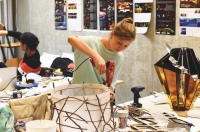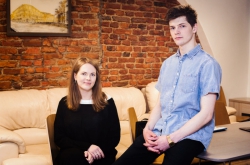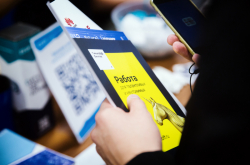You got both your Bachelor’s and Master’s degrees at ITMO’s Faculty of Physics and Engineering. What prompted you to take on another Master’s degree in Germany?
Back when I was doing my Master’s program in ITMO University, I decided to go on a winter semester exchange at the Federal Institute of Technology in Lausanne, Switzerland. While I was there, I really enjoyed the educational process and the atmosphere. My Master’s degree was drawing to a close, but this experience made me realize that I needed to continue with my education. There was another influencing factor. As I was on an exchange in Switzerland doing IT and Physics, I missed a lighting design course in ITMO University. I knew that I could work in lighting design with my then level of knowledge, but in order to be able to advance in my career further studies were necessary. I had several options; I could have followed up with a PhD in Russia or pursued another Master’s degree abroad, which I favored in the end. Country-wise, Germany was the most appealing because it offered free education and was closer to Russia than my other options. I did my research and found the highly reputed Hochschule Wismar University of Applied Science Technology, Business and Design, where I went to do my Master’s degree.
What was the language of your studies? How crucial was it to know German?
The program’s working language was English, so I didn’t need to prove my level of German, which initially wasn’t very good as I hadn’t studied it before. It wasn’t easy to get around without knowing German: Wismar is a small town, English is not widely spoken, and all the paperwork and official interactions are carried out in German. International students did get help, but difficulties persisted. That’s why in my first semester I chose to study German as an optional subject. I studied it twice a week in a classroom and consistently on my own, but as the next semester’s curriculum was more intense, I had to drop it. My Master’s degree included a year of lectures and hands-on training, six months of internship, and six months of writing a thesis; the latter two could have been done anywhere in the world, I just needed to show up in Wismar for the final exams. I left Wismar for the internship and abandoned my German studies, which I had to pick up later as I needed it for my work, where, by the way, I switch between English, German, and sometimes even Russian. I use Russian when working on Russian projects or talking one-on-one with a Russian company representative.

Did you go through the application process alone?
I did everything on my own. First, I spent a lot of time scrutinizing the universities’ websites, which wasn’t easy as most of it was in German, and so the rare remarks in English made me very happy. My next step was contacting the universities and finding professors and employers to give me letters of reference. Since education in Germany is free, there’s an extremely high competition for program places: on average, the university annually admits only 20 students from all over the world. My 40-people class was an exception, though. It was very international, with students coming from more than 23 countries. Admission success largely depends on an applicant’s experience. All of my fellow students were older than me and had relevant work experience than spanned at least several years. The university chooses students based on their motivation and versatility of skills. That’s why a portfolio plays such an important role.
How did you create your portfolio? Are there any rules regulating this process? Why do you think you were selected?
Your portfolio speaks volumes about your creativity and skills. I had some published scientific papers, but I focused on the portfolio as I believe that real practical experience is more valuable. My advantages were my technical education and creative task-solving approach which lends from my Physics and Design skills and is therefore quite rare to find. There are no set rules for creating a portfolio; the only regulation is that it has to consist of 15 to 20 pages where you’re advised to show the versatility of your work, skills, and accomplishments. When I started to shape my portfolio, I did some market analysis in order to find out which software and tools were in use by specialists in my field of work. If I didn’t know a program, I studied it thoroughly and tried to put it to use and then feature it in my skills set. Some of my portfolio cases were real projects I did for the Russian company I worked in; some existed as mere concepts, and others were tailor-made for the portfolio to display my skills. Sometimes I chose a case off the internet and tried to do something similar, but with an personal twist.
How long did it it take you to prepare for the admissions process?
I did my preparation in parallel with finishing my education in Russia. Admissions to German universities usually close six months before the studies start; it’s even earlier for some higher education institutions. If you want to continue your education abroad, you’d better start considering your options a year before leaving. You should also take into account that most universities will ask you to prove your language proficiency level, and this takes time, too. If you can’t prepare for the exams by yourself, you’ll need to enroll in preparation courses which last 2 to 3 months at least. I learned English on my own, but decided to take an exams course just to be on the safe side and get used to the exam format.

Did you apply for any scholarships?
No, I thought that I could get a scholarship within my university, but scholarships in Germany are a very complex system which is worth some further looking-into. DAAD (the German Academic Exchange Service) also couldn’t provide me with financial support back then. Due to the abundance of incoming information, I’ve missed out on many scholarship opportunities; my goal was to be admitted to the university, and so I focused on submitting all the documents before their deadlines. There’s a lot of information on scholarships, but the problem is that it’s scattered between many websites. There are state and industry scholarships for some study fields such as law and economics, but finding something for lighting design was a challenge.
Although I didn’t have a scholarship, I did manage to find a side-job. When I was studying in Wismar, I did part-time work for a professor helping him do various education tasks, which just about covered my day-to-day expenses. I also organized a Latin American dance club at my university for the additional income, but it was really hard to keep it up with my study schedule.
Where did you intern in the second year of your studies?
Each student had to arrange an internship on their own. The most help we could have counted on from the university itself were our professors’ connections within the industry. Professors would also forward internship ads to our group email so that we could send them our CV. European and US companies have extremely high demands for interns despite the fact that you practically work for free.

I did my internship in a New York-based company, which I found myself. The company I applied for ranked as one of the best lighting design companies US-wide; it created flagship models for lots of big projects in the US and France, from the big fashion brands, restaurants, and hotels to skyscrapers and bridges. Over the course of my internship I worked on many projects and in many capacities: sometimes I designed models, sometimes I did calculations and made drafts. I consider myself very lucky as working on lots of small projects enabled me to develop different skills. Some of my classmates went to do big projects which spread over the whole semester. Before my internship I’d already been in the US as part of a Work & Travel program, and so the country was more or less familiar to me. I intended on doing an internship in an English-speaking country as I wanted to fully immerse myself in work. So I started monitoring top companies in the UK and US and found the company where I ended up interning. They hired me after setting up an interview on Skype.
Was your Master’s program in Germany more difficult than the one in Russia?
My Master’s program in Germany involved much more group projects, which was pretty challenging as different students had different levels of experience. Moreover, the projects in Germany seemed more serious than the projects I worked on back in Russia. But the Lighting Design program at ITMO has gone through significant changes over the past three years. Ours was a pilot program, we tested different study formats, so I can’t really compare the Lightning Design program currently on offer in ITMO to that in Wismar.
You work for a German company that specializes in lighting design. How did you find this job and what are your responsibilities?
I’d say that it was the job that found me. When we were searching for internships, my classmates and I attended Light and Building, the biggest lighting design fair held in Frankfurt, and talked to the representatives of different companies. Prior to going to the fair, I posted my CV on its website. That’s how I was noticed by my current boss; she said afterwards that it was my technical academic background that got her interested. We first met at the fair, where I was invited to an interview in Berlin. I didn’t know whether I wanted to work in Germany by then, but decided to take a shot. In the end I was hired not as an intern, but as a full-fledged employee; this was a first for my company.

Today, I work as a lighting designer, which mostly involves me developing project concepts. We are commissioned to create external or internal lighting for various different spaces: from restaurants and museums to airports and city streets. We develop initial concepts, send them to a client for approval, then, on the basis of the chosen option, make drafts and calculations, do 3D modeling, carry out practical tests; in other words, we conceptualize a project and lead it to its full completion.
You started working while still writing your thesis. Was it challenging?
Very challenging; I wouldn’t recommend it to anyone. Students in Europe don’t usually work full-time when writing a thesis, they only work about four days a week and even then are not required to do their utmost best. I was offered to work part-time when my boss saw that I was snowed under with my thesis, but I refused and decided to go all the way. I wrote my thesis during the weekends, and that was tough. You can’t just write your thesis in two weeks, it has to be a semester-long study which requires constant work and dedication.
Which everyday difficulties do you encounter living in Berlin?
When you live on your own, you have to take care of lots of things, for example, taxes. Taxes is like Germany’s national sport. You have to pay taxes on radio, TV, and various other things that aren’t obvious to a Russian person. You get fines, you have to think about where and how it is better to register for taxation, always be in time to submit your declarations, and keep tabs on your visa. For instance, I was on a student visa, which allowed me to work for a limited amount of time, following which I had to change my visa status or stop working altogether. To change your visa status you have to submit your application to an international office 2 to 3 months before the expiration of your work limit. But when I found out about it I didn’t have the time to proceed with it all, and so I had to take some time off work. I was unaware of many things, which then led to a lot of nerves, tears, and money expenses. But I adapted.

How willing are German employers to take on foreigners? Can you find a job without knowing German?
Although I work in a German company, only half of my coworkers are German, others hail from all around the world. Employers value foreign workers as they understand that the latter have to try harder. Although it’s not stipulated in the contract, you’ll have to learn German if you want a successful career. In our company there is an unspoken rule that if you’ve studied German, people will speak German to you to give you some extra practice. But some companies only hire people who are able to speak German.
Do you plan on returning to Russia?
This is a complicated question as I still haven’t decided where I’d want to live. I’ve been working in Berlin for a year and a half now, I like my company and co-workers, but I can’t confidently say that I feel comfortable in this city. I’d like to embark on a different European adventure, and I’ll always have the opportunity of returning to Russia if I want to. Moreover, there aren’t many job opportunities for lighting designers back at home; people here are not as willing to splurge on lighting design as big as they do in Europe. Lighting design is still developing in Russia. But I believe that we’re on our way.





